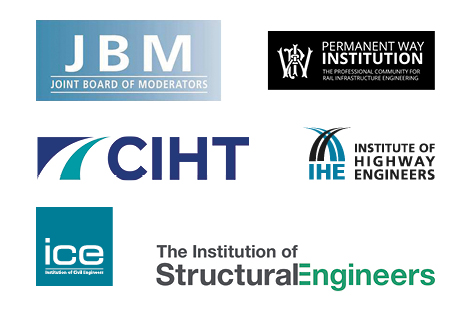Structure
Incorporating professional development in the workplace alongside academic study, this programme provides apprentices with the opportunity to achieve a BEng award in Civil Engineering while developing valuable professional skills and workplace experience.
Apprentices will spend one day per week studying with the university during term time by attendance of lectures, tutorials, laboratory sessions and completion of coursework which will fulfil the module criteria.
With support from the employer, apprentices are required to spend 20% of paid working hours on studies and be able to evidence this. This is a statutory requirement for apprenticeships and the funding is conditional on this being met. Off-the-job learning includes activities which have not previously been a part of the role or furthers apprentices development into new areas.

This degree is accredited until the intake year of 2024 by the Joint Board of Moderators (JBM), comprising the Institution of Civil Engineers, Institution of Structural Engineers, Institute of Highway Engineers, the Chartered Institution of Highways and Transportation and the Permanent Way Institution, on behalf of the Engineering Council for the purposes of partially meeting the academic requirement for registration as a Chartered Engineer (CEng). We are in the process of gaining accreditation for the new course structure. Submission to the accreditation body will take place in January 2026.
Candidates must hold a masters or doctorate accredited as further learning for CEng to hold accredited qualifications for CEng registration.
See www.jbm.org.uk for further information and details of Further Learning programmes for CEng.
As part of this accreditation, we have achieved AHEP 4 standard meaning that our degrees meet the requirements of the Engineering Council’s Accreditation of Higher Education Programmes (Fourth Edition) in engineering, in line with the UK Standard for Professional Engineering Competence.
Teaching and assessment
A broad range of teaching methods are used to meet the intellectual, academic and professional objectives of the programme while remaining inclusive to apprentices needs.
Apprentices learn through lectures; tutorials; seminars; case studies; laboratory and practical classes; fieldwork; flipped learning; IT projects; workshops and group projects. The multifaceted aspects of the application of engineering, information, information technology and computing are a continuing theme throughout the programme.
Apprentices are encouraged and supported to achieve their learning potential and develop their confidence through tutor-led and work-based learning. Towards the later stages of the programme, learning becomes apprentice-centred with a greater choice of optional modules.
Assessment is seen as an integral part of the system of teaching and learning strategies for the programme. Its aims are to foster, develop and test knowledge, skills, understanding and personal qualities as they may apply in the content of an engineer. Methods used include:
- exams, including open book and seen and unseen papers
- individual and group project work
- laboratory and field reports
- presentations
- interviews
- portfolio.
Employer and apprentice commitments
In order to deliver the programme, the employer undertakes to:
- conduct a workplace induction and set out a contract of employment
- provide a workplace mentor to supervise and monitor the progress of the apprentice
- release apprentice for scheduled off-the-job training
- ensure apprentices have continued protected time outside of term for off-the-job training
- provide opportunities in the workplace to meet work-based learning requirements.
Throughout the programme, apprentices will:
- attend the workplace for the agreed pattern as set out in the employment contract
- record all training sessions and off-the-job learning
- attend scheduled university learning sessions and complete all assessments as required by the university and End Point Assessment Organisation
- behave in a safe and responsible manner at the workplace and university
- engage with regular progress reviews
- complete a professional development portfolio throughout the apprenticeship.
Staff profile
Dr Maria Diakoumi is a principal lecturer in civil engineering in the School of Environment and Technology. She has over 10 years of both academic and industrial experience in the field of geotechnical engineering.
Dr Diakoumi graduated from Aristotle University of Thessaloniki, Greece, with a Diploma (MEng equivalent) in Civil Engineering in 2003 and was awarded a PhD from the University of Southampton, in 2007. She received a Postgraduate Certificate in Learning and Teaching in Higher Education in 2010. She worked as a civil engineering consultant on the design of major underground projects in London for the Mott MacDonald Group and as a part-time lecturer during her PhD studies (2003–2007) at the University of Southampton.
She has held several roles within the School of Environment and Technology and led the BEng and MEng programmes in Civil Engineering (2014–2017) as course leader, working with colleagues to develop course content, accreditation activities, the student learning experience and links with external bodies.
Dr Diakoumi has collaborated in various research projects which have been funded by the European Union (FP7, Interreg), the Royal Academy of Engineering, the Higher Education Academy and UKaid.

Facilities
The School of Architecture, Technology and Engineering has well-established laboratories in which apprentices are given practical experience supported by our skilled and knowledgeable technicians. This includes:
- hydraulics lab
- modelling studio
- dynamics lab
- heavy structures lab.
Apprentices are provided with many opportunities to engage with the university’s community, including through university induction, access to extensive library facilities, becoming course representatives and having a personal tutor for advice and guidance.
Fees and funding information for apprentices
Course fees
As an apprentice, the cost of your learning programme is covered by your employer through their Digital Apprenticeship Service (DAS) account.
Student finance
Higher and degree level apprentices are not eligible for any element of student finance. This is because they receive a salary instead of the student loan package. However, if you are experiencing any financial difficulties, please contact the Student Advice Service on 01273 642 888.
Learning support
Apprentices studying at Higher and degree level may be able to access funding in relation to additional support, but this is available through the university and not Disabled Students Allowance. Apprentices may also be able to apply for Access to Work funding for work-based equipment and software. Please contact the Disability and Learning Support team on 01273 643 799.
Living costs and benefits
Higher and degree level apprentices must fulfil the standard eligibility criteria in order to apply for means tested benefits such as Universal Credit, Child Tax Credit and Housing Benefit. If you have any questions about entitlement to benefits, please contact the Student Advice Service on 01273 642888.
Higher and degree level apprentices who are undertaking a full-time mode of study can be treated as being exempt from paying Council Tax. Although some programmes require study on a day-release arrangement, this can still be classed as full-time study. You will need to obtain a letter from the Student Support Desk at any campus and send this to your Council Tax department when you register on the programme.
Other
Brighton and Hove bus discount
NUS card